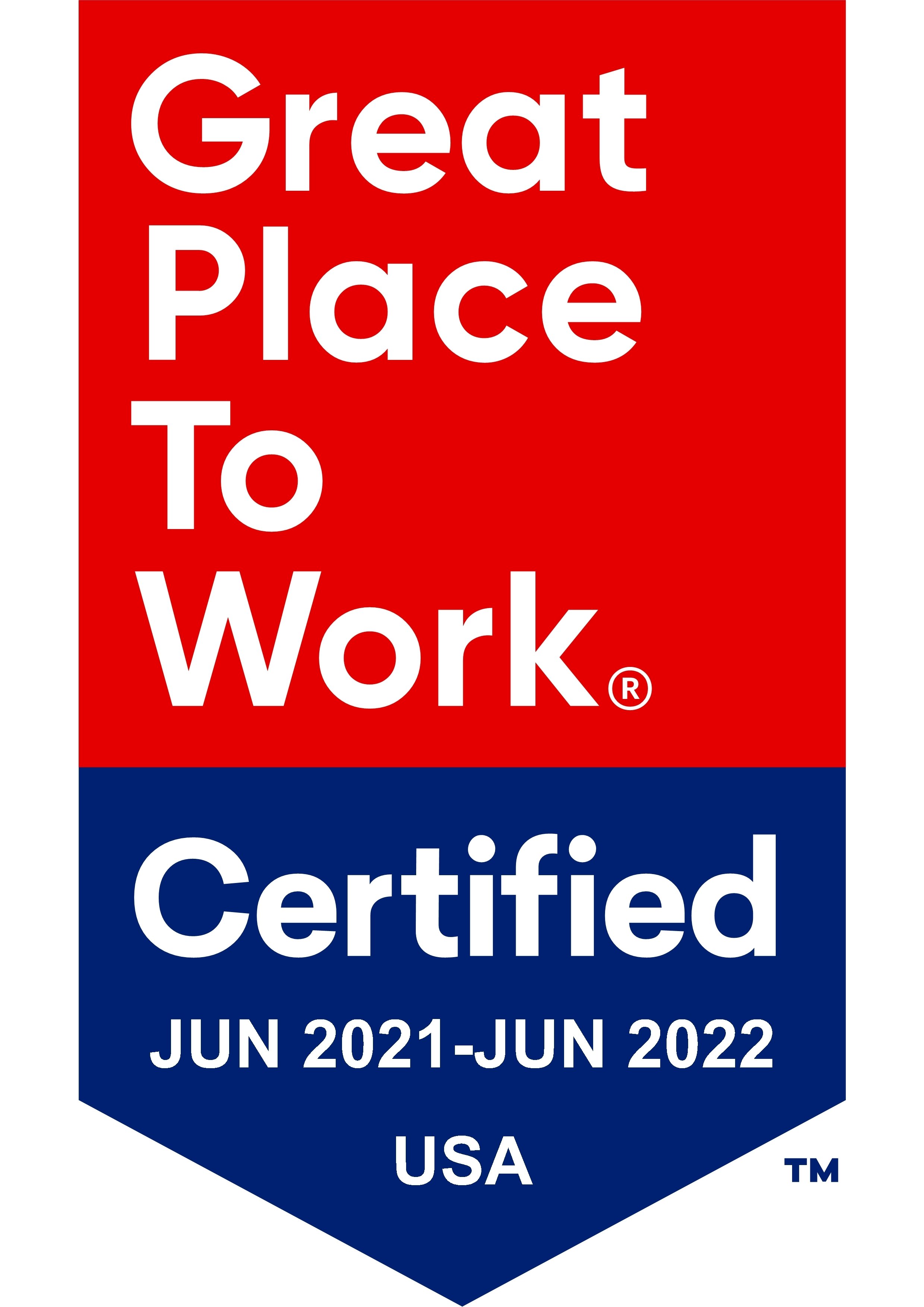Microsoft made a $10 billion investment into OpenAI but comes in 6th on brands associated with AI
Artificial Intelligence (AI) has emerged as a transformative force, reshaping industries and revolutionizing the way we interact with technology. Its applications, spanning from virtual assistants and autonomous vehicles to personalized recommendations and predictive analytics, have woven AI into the fabric of our daily lives. As AI's influence continues to expand, perceptions and associations with the brands that harness this technology become increasingly significant. Brand associations play a pivotal role in shaping consumer behavior, guiding preferences, and influencing all types of decisions.
For me, as a Gen Z and student, I hear a lot about AI from my friends and on social media. Different brands are doing various things and it’s fun to check it all out.
In February Reach3 conducted a study on AI just as it was beginning to take off. Now, nearly half a year later we decided to conduct another to visualize how far it has come and how its perceptions have changed. In just those 6 months, we’ve seen the number people that have used or tried out an AI tool increase, reaching 71% this month (among those at least somewhat familiar with Generative AI). AI is hot and with so many more getting hands-on time with AI, how has that affected which brands they associate with AI and how they feel about that?
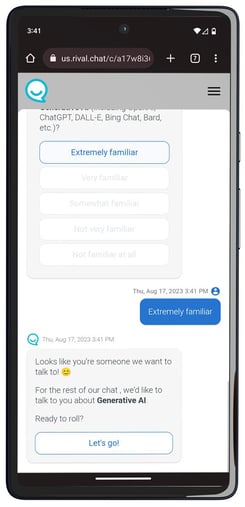 We used our conversational approach and Rival's mobile-first market research platform to talk with nearly 750 consumers from across the US, aged 13-60, who are at least somewhat familiar with Generative AI. Through our conversational insights approach using the mobile messaging-based Rival platform, we learned how consumers feel about AI/ChatGPT, future impacts, and top brands associated with these new tools. Last week, we shared findings on overall sentiment and we have upcoming articles on AI's uses in education/work, as well as e-commerce and online advertising — for today let’s talk about brands and AI.
We used our conversational approach and Rival's mobile-first market research platform to talk with nearly 750 consumers from across the US, aged 13-60, who are at least somewhat familiar with Generative AI. Through our conversational insights approach using the mobile messaging-based Rival platform, we learned how consumers feel about AI/ChatGPT, future impacts, and top brands associated with these new tools. Last week, we shared findings on overall sentiment and we have upcoming articles on AI's uses in education/work, as well as e-commerce and online advertising — for today let’s talk about brands and AI.
Which companies come to mind for AI?
According to our research, tech companies understandably dominated the results (95% listed at least one tech company) with Google the clear leader in the public's associations with AI (75%). By comparison, Finance, Apparel, and Travel companies each had less than 25% associate them with AI. The reality is that these companies will implement AI in some form in the coming future—if they haven’t already!—but even if they adapt it, will still be nearly impossible to be associated with AI on the same level as tech companies.
One thing to note is the discrepancy between Google and its fellow competitors. I find it interesting that Google is #1 when it’s usually ChatGPT that gets name checked. Microsoft made a $10 billion investment into OpenAI (the company that created ChatGPT) but comes in 6th on brands associated with AI (Microsoft: 48%). Microsoft is clearly playing the long game and is likely less concerned about public awareness than future AI applications, but $10 billion is a lot of money to spend only to be outshined by others so far.
One hypothesis is that Google, Amazon, and Apple had a jump start with their presence in the voice assistant space. While Assistant, Alexa, and Siri aren’t really what we’re starting to understand is real Generative AI, they can feel like the assistant is thinking like an AI even if its capabilities are more limited.
“When I think of the leaders in the generative AI space, the first brands that come to mind are the major tech companies such as Apple, Google and Amazon. We've been reliant on personal assistants provided by these companies, such as Siri, Google Home and Amazon, Alexa. But ChatGPT makes these other things look primitive." — Male, age 18-20

How’s it changed in the past 6 months?
With more Americans testing Generative AI today, you’d think these brand associations may have been different half a year ago but honestly, there hasn’t been much change. Besides the fact that companies are becoming more associated with AI, the rank order of companies most associated with AI has barely budged. The top five companies are nearly identical with the only change being TikTok overtaking Microsoft for the fifth spot. So as big as the changes and leaps have been in the world of AI, they still were not big enough to shift the perception of consumers. Have the winners and losers already been decided in the minds of consumers? Time will tell and it’s more likely consumers will become more familiar with the outputs of AI than whichever tools or companies are building and developing them.
Brands Most Associated with AI
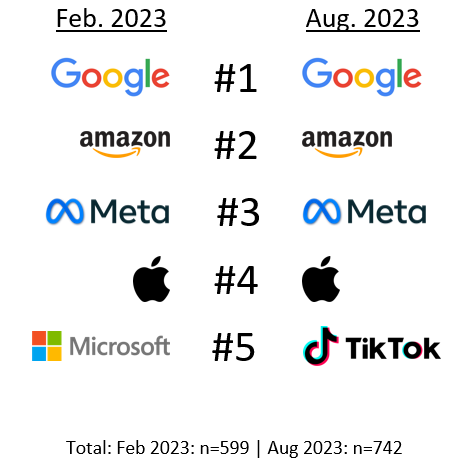
“Facebook since it collects your data to give you personalized ads, and Snapchat since it has its own AI for people to use. Siri from Apple, and Google.” — Female, age 13-17
Are brands outside of Tech associated with AI?
What about brands that are outside of the tech circle? These are still far, far from being associated with AI, though it’s likely only a matter of time before AI technology impacts these areas in more subtle ways. The entertainment industry is grappling with AI as that’s a large component driving the current writer’s and actor’s strike. And the shopping industry has long had product recommendations but what happens when AI gets added into the shopping mix? Stay tuned on that last point, we have another article in the works all about shopping and AI.
Brands Most Associated with AI—Feb vs. August 2023
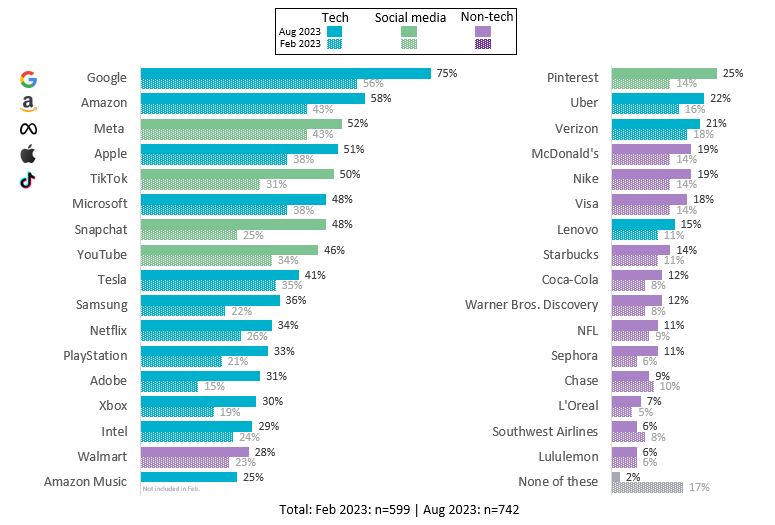
Age differences with social media and AI
One key difference that can't go without mentioning is between younger (age 13-30) and older (31+) Americans when it comes to social media and AI. Companies such as Snapchat, Meta (Facebook), and TikTok dominate the social media market, and when looking at the collective they all had around 50% of our participants associate them with AI. However, when comparing the association within the two age groups, you can see a clear distinction. 61% of those age 13-17 associate Snapchat with AI, which is significantly higher than those age 21+, perhaps due to Snapchat’s My AI feature that’s been in the app since April for all users. TikTok also jumps from 5th to 3rd in brands that teens associate with AI. It’s easy to visualize how the technology you use shapes your perception of the companies that are associated with AI even if there isn’t a monumental difference between the two.
“Snapchat with its AI chat bot is the most 'branded' one I can remember.” — Male, age 13-17
Social Media Brands Associated with AI
The rapid evolution of AI's presence and influence demands a constant reevaluation of brand associations throughout every market. The correlation between brand popularity and AI perception, alongside the age-driven disparities in social media brand associations, signifies the intricate ties between technology, brands, and consumer perception in the AI landscape. As AI continues to pop up in every facet of modern life, understanding and harnessing these associations will be integral to shaping consumer behavior and industry landscapes.
Want to understand where AI fits with your brand?
Working on this project definitely sparked my curiosity and interest in finding out how people think. I can see how research is truly valuable to companies.
Curious how we capture those insights? It's because of conversational research—an approach that feels immersive, natural and organic to participants. The tech that we use, combined with the way we design our research studies, delivers a more fun respondent experience without compromising on rigor or robustness of our studies.
If you're looking for a full-service market research firm to partner with to understand what's next in Generative AI, Reach3 has the experts you need in the tech industry who can help you navigate what's ahead. Also, the Rival platform, which is the core technology in most our research studies, uses AI to make it easier and faster to capture deeper insights.
Have a new research topic on your roadmap? Curious about our capabilities and product roadmap? Reach out to our team and see how we can work together.

Anton Gridley
Summer Intern, Reach3 Insights





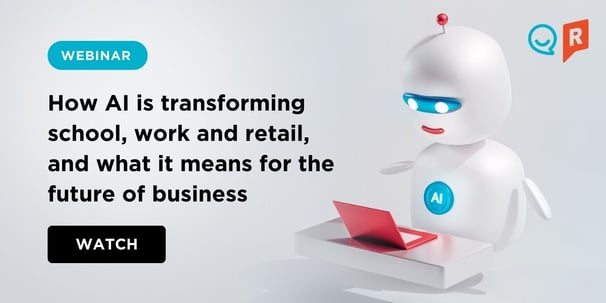


.webp?width=65&height=83&name=A-LIGN_HIPAA%20(1).webp)

